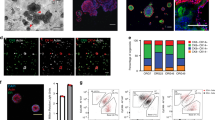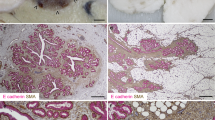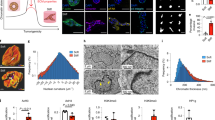Abstract
IN a pilot study on the culture of unselected human breast tumours it was found that fibroadenomas which were disrupted mechanically (without enzyme treatment) consistently gave rise to epithelial cell cultures uncontaminated by fibroblasts1. These epithelial cells, which were termed E cells, could not be distinguished from the major class of epithelial cells isolated from lacteal secretions of healthy women2,3. It is not known whether the fibroadenoma yields epithelium which is truly normal (and is thus a fibroma), or whether the epithelium is abnormal in a way not yet identified. Nevertheless, the reproducibility of the cultures from these tumours, together with ease of storage at low temperature, makes them suitable for detailed studies on mammary epithelial growth, and for comparison, not only with lacteal secretion cells, but with the more heterogenous cultures from carcinomas. We describe here some of the growth characteristics and requirements of epithelial cells from fibroadenomas, and in particular their response to epidermal growth factor4, but lack of response to more familiar mammotrophic hormones.
This is a preview of subscription content, access via your institution
Access options
Subscribe to this journal
Receive 51 print issues and online access
$199.00 per year
only $3.90 per issue
Buy this article
- Purchase on Springer Link
- Instant access to full article PDF
Prices may be subject to local taxes which are calculated during checkout
Similar content being viewed by others
References
Hallowes, R. C., Millis, Rosemary, Stoker, M. G. P., and Taylor-Papadimitriou, J., Clin. Oncol. (in the press).
Gaffney, E. V., Polanski, F. P., Blackburn, S. E., and Lambiase, J. P., Cell Tiss. Res., 172, 269–299 (1976).
Taylor-Papadimitriou, J., Shearer, M., and Tilly, R., J. natn. Cancer Iust. (in the press).
Cohen, S., J. biol. Chem., 237, 1555–1562 (1962).
Cohen, S., and Taylor, J. M., in Epidermal Wound Healing (edit. by Maibach and Rovee), 203–218 (Yearbook Medical, Chicago, 1972).
Armelin, H. A., Proc. natn. Acad. Sci. U.S.A., 70, 2702–2706 (1973).
Hollenberg, M. D., and Cuatrecasas, P., Proc. natn. Acad. Sci. U.S.A., 70, 2964–2968 (1973).
Cohen, S., Carpenter, G., and Lembach, K. J., Adv. metabolic Dis., 8, 265–284 (1975).
Turkington, R. W., Expl Cell Res., 57, 79–85 (1969).
Carpenter, G., and Cohen, S., J. cell. comp. Physiol., 88, 227–238 (1976).
Byyny, R. L., Orth, D. N., Cohen, S., and Doyne, E. S., Endocrinology, 95, 776–782 (1974).
Author information
Authors and Affiliations
Rights and permissions
About this article
Cite this article
STOKER, M., PIGOTT, D. & TAYLOR-PAPADIMITRIOU, J. Response to epidermal growth factors of cultured human mammary epithelial cells from benign tumours. Nature 264, 764–767 (1976). https://doi.org/10.1038/264764a0
Received:
Accepted:
Issue Date:
DOI: https://doi.org/10.1038/264764a0
This article is cited by
-
Biochemical study of cyst fluid in human breast cystic disease: a review
Breast Cancer Research and Treatment (1992)
-
Effects of growth factors on proliferation of basal and luminal cells in human breast epithelial explants in serum-free culture
In Vitro Cellular & Developmental Biology - Animal (1992)
-
EGF binding is quantitatively related to growth in node-positive breast cancer
Breast Cancer Research and Treatment (1988)
-
A new diploid nontumorigenic human breast epithelial cell line isolated and propagated in chemically defined medium
In Vitro Cellular & Developmental Biology (1987)
Comments
By submitting a comment you agree to abide by our Terms and Community Guidelines. If you find something abusive or that does not comply with our terms or guidelines please flag it as inappropriate.



